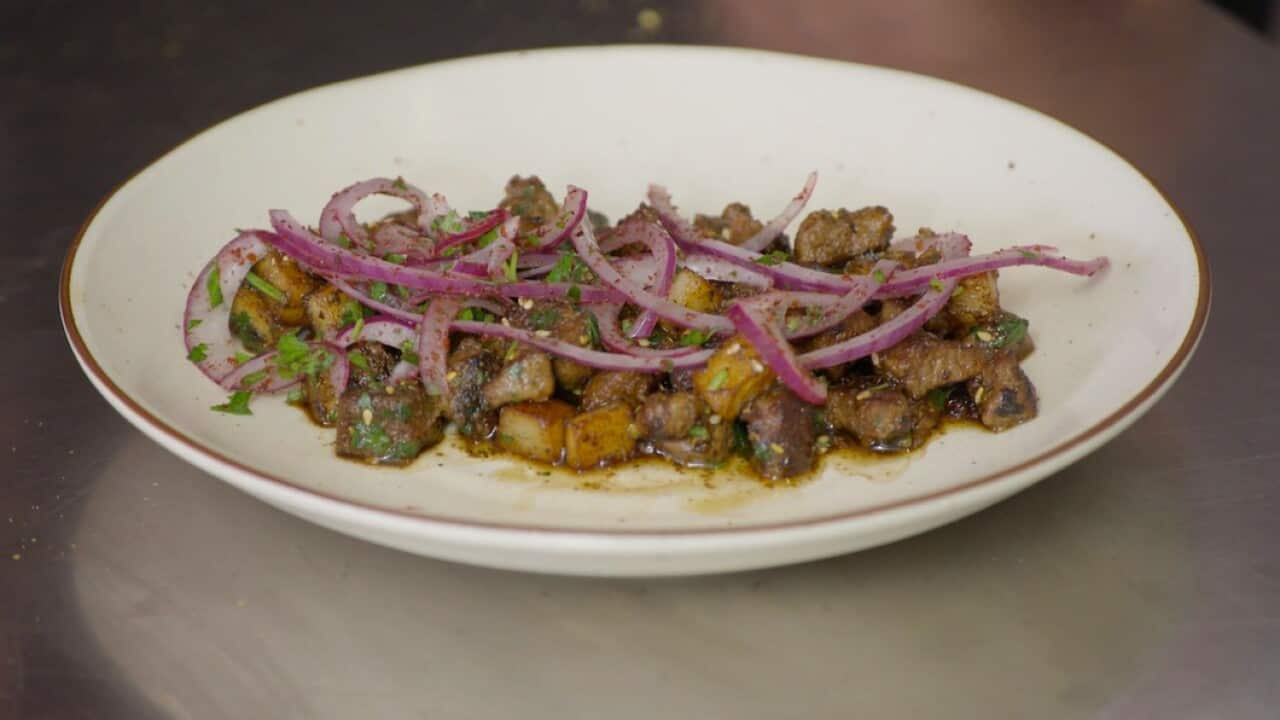If you want to ease yourself into eating a new ingredient, think of rolling it in breadcrumbs, frying it, and serving it with a creamy sauce kind of like training wheels—it helps with accessibility, before you take on anything more challenging. Lamb's brains work particularly well cooked in this way as they're tender and sweet, which contrasts well with the crisp crumbed shell.

Crumbed lamb’s brains with horseradish mayonnaise.
Earthy chicken livers are cooked up with a sweet, salty, aromatic assortment of flavours. Pair the livers and apples with crusty bread for an elegant entree.

Seared chicken livers, sage and Golden Delicious. Source: Sharyn Cairns
Treat these hearts with some searing hot stove-top love to keep them tender.

Beef heart kebabs. Source: Alan Benson
If you're not sure about the idea of eating pig's ears, just think of them as meaty-tasting chips. In this case, fancy meaty-tasting chips, as they're served with almond puree, caramelised onion, and a few other ingredients signature of the Andalucian region of Spain.

Crunchy pig's ear and morcilla with quail eggs and jamón. Source: Shane Delia's Moorish Spice Journey
Pork belly, not trotters, are traditionally used in okonomiyaki, but trotters are cheap and novel, nose-to-tail alternative. They're simmered for a few hours to become tender, then the picked meat is fried in oil before being added to the pancake batter.

Japanese pancake with crispy trotters (okonomiyaki). Source: Alan Benson
Beef shin is generally regarded as a lesser cut because of the high amounts of connective tissue. But what this means is it just needs to be cooked low and slow to break down the fibres. The result is a dreamily rich, tender and moist meat dish.

Beef shin with smoked dulse. Source: Hardie Grant Books / Andrew Montgomery
Beef tongue is a flavourful cut similar to steak meat, and is popular in many cuisines. In Japan, there's entire "gyutan" (beef tongue) specialty shops. In Mexico, tacos de lengua are a classic way to serve tongue. The tongue is simmered until soft, then grilled until is crisp and dished up with signature Mexican condiments like salsa, lime, avocado and coriander.

Beef tongue tacos. Source: Michelle Crawford
A good long and slow cook gives pork neck the time it needs to transform from a muscley, fatty cut to one with a deliciously melting texture. The fragrant and spicy traditional Korean soup, gamjatang, is a perfect way to do just that.

Pork neck soup (gamjatang).
Ok this might not be an everyday dish - you’ll need to source an entire pigs head - but it’s one that gives you serious nose-to-tail kudos. Pig’s head is loved by chefs because it's full of different porky flavours and textures.

Pig’s head terrine with brains, yabbies, shallots and parsley.
Like many great dishes and ingredients, tripe was once a dish regarded as the food of paupers and working class, but is now served on the menus of upmarket restaurants. Tripe is like a flavour sponge, soaking up whatever stock it's cooked in; here, it's a bright-tasting brew of tomato, fennel, saffron and chilli.

Tripe with tomato and fennel. Source: China Squirrel
A crunchy, creamy and light autumnal meal that's ready in 20 minutes. Orecchiette – “pigs ears” (referring to the shape of the pasta, nothing to do with the ingredients!) – seems like a fitting choice for an offcuts pasta dish.

Orecchiette with duck livers, celery, apple and hazelnuts. Source: Sharyn Cairns






